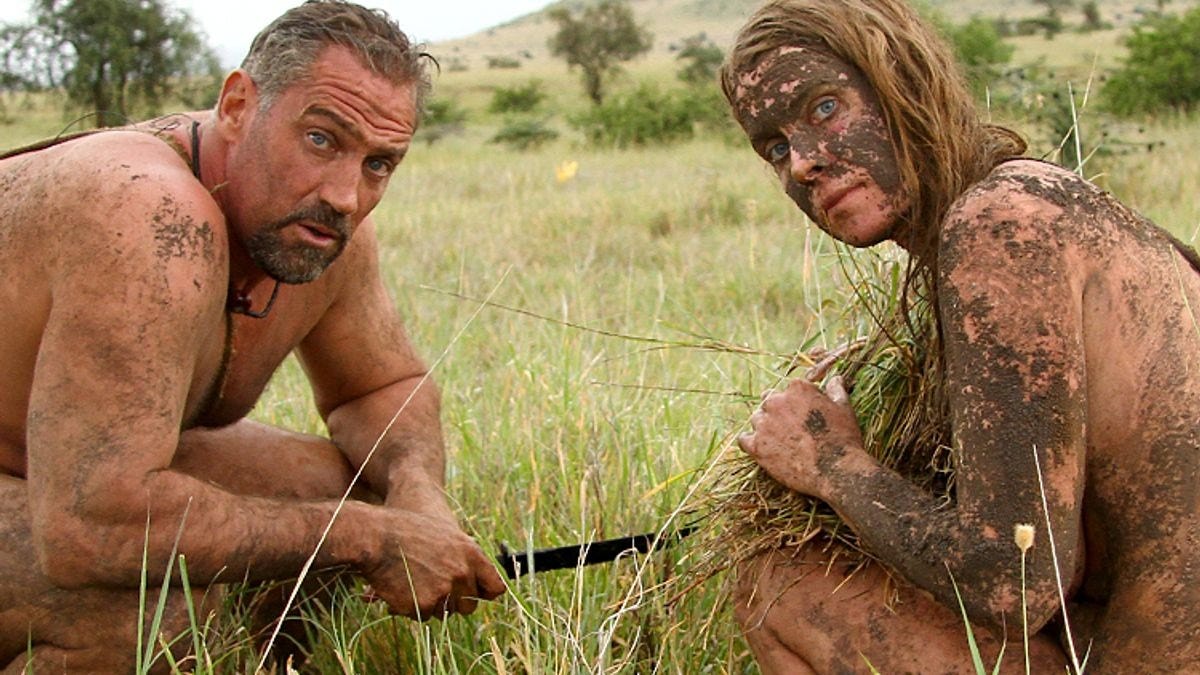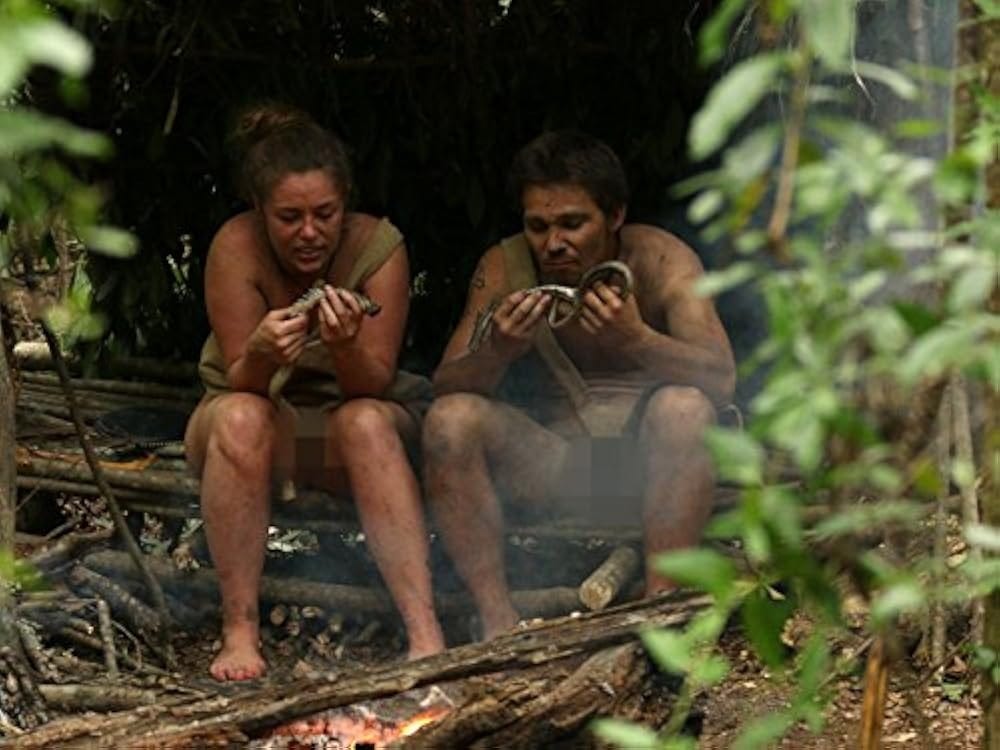Naked And Afraid: From Bodies to Bits.
How Knowledge Lost Its Weight (& some useless "good advice" you won't take anyway)
We live in weird times. Never before have humans had access to this much knowledge about how to improve their lives—yet we still struggle to put any of it into practice. If anything, the gap between knowing and doing seems to be growing.
What’s going on?! Let’s see:
I love watching Naked and Afraid. Not just for the survival challenges, but because it’s one of the best displays of human nature in action.
Almost every episode starts the same way. The contestants introduce themselves, talking about all their skills—primitive fire-starting, foraging, hunting, shelter-building. They’re big fans of the show. They know exactly what to do. They’ve studied the skills, practiced them in controlled environments, maybe even taught others. Yada yada yada.
And then, reality hits.
No more theory. No more practice runs. No controlled conditions.
The sun is brutal. The insects never stop biting you know what. The cold at night is relentless and it’s awkward to cuddle with a stranger. That fire-making technique they mastered at home doesn’t work when everything is damp, when they’re exhausted, when their hands are shaking. They are hungry, angry and sleep-deprived.
At the start, nearly all of them say the same thing: “There’s no way I’m quitting.” And yet, within days, many tap out.
Not because they didn’t know what to do. But because knowing is not the same as doing.
The Implementation Gap
Our ancestors learned because they had to. Knowledge was rare, valuable, and directly tied to survival. You didn’t just read about how to start a fire or track an animal—you figured it out, hands-on, or you went hungry. Learning was embodied, meaning it wasn’t separate from living; it was part of it.
Then writing changed everything. Suddenly, knowledge could exist outside of people. It could travel across time and space without needing a human carrier. This "disembodiment" of knowledge accelerated with each new technology: the printing press, radio, TV, the internet. Each step made information more frictionless, faster to spread, easier to copy.
From Letters To “LOLs”
Not long ago, the medium was the messenger. The way information arrived told us something about its importance. A book, a lecture, a newspaper headline—each carried an implicit weight, a level of trust, some built-in curation. Someone had filtered what was worth paying attention to.
No more. Now everything arrives in the same medium. (And ends in your spam).
The most profound insights and the most meaningless distractions both hit our screens in identical formats—same fonts, same layouts, same algorithms deciding what we see. High-quality knowledge and absolute garbage exist side by side, with no natural signal to separate them.
And now we have to do all the filtering. Constantly.
It’s exhausting.
Ancient Brains - Modern Maze
Your brain is still running hunter-gatherer hardware. It forms new habits and integrates information through mechanisms that need time, repetition, emotional connection, and real-world context. It wasn’t designed to rapidly absorb abstract concepts divorced from experience.
When you read about some cool productivity hack or health intervention, you get it conceptually. But your brain doesn’t automatically translate that into action. That translation requires embodiment—turning abstract knowledge into lived experience through practice and integration.
This process slams into some hard biological limits:
You can only consciously focus on a tiny slice of your environment at once.
Your working memory can juggle only a few things at a time.
Your willpower is a finite resource that depletes with use.
Creating neural pathways takes consistent repetition over weeks or months.
This creates a massive bottleneck between how much we can consume and how much we can actually implement.
So we suffer from frontal fatigue—the exhaustion that comes from constant filtering, decision-making, and self-curation.
It’s easier to just consume passively than actively choose what’s real and worth pursuing.
And so, more and more, we don’t decide.
We scroll. We tinker. We refine our digital selves.
But we don’t embody anything.
The Never-Ending Search
And the flood of good advice doesn’t help.
Should I try this productivity system or that one? This diet or that workout? Every option comes with persuasive arguments and glowing testimonials.
So we get stuck in "optimization loops"—constantly researching and comparing rather than committing to any of them. We burn mental energy on evaluation instead of execution.
And then? We have nothing left for the actual work of change.
The modern information ecosystem feeds this trap. Content creators are incentivized to make change sound easy, results sound dramatic, and everything sound like the missing piece you’ve been looking for.
So when reality proves messier, we doubt ourselves and go back to searching for something "better."
Fake Productivity
At some point, we realize we’re not actually doing anything. That realization is uncomfortable.
So we simulate progress.
We make elaborate plans. Organize our notes. Watch more videos and read more books. These things feel productive, but they don’t actually create change.
It’s consumption disguised as production.
And just as we were drowning in passive consumption, AI came along—not to save us, but to accelerate the flood.
“And Then AI Crashed the Party”
Now, knowledge isn’t just abundant, it’s instant and infinite. AI-generated insights, recommendations, and strategies flood in on demand. The knowledge-implementation gap is exploding.
AI can help implement. It can remind you, structure your tasks, track your progress. But here’s the problem: It can’t embody knowledge for you.
The really dangerous part is: we might start outsourcing judgment itself.
Instead of developing our own wisdom about what’s worth implementing, we just ask the AI what to do. That’s not just outsourcing action—that’s outsourcing agency.
Also! You Can Be Anyone You Like
But AI isn’t just flooding us with information—it’s making it easier than ever to construct perfect digital versions of ourselves.
Then, as curation became easier, the real gold was in curation based on lived experience and implementation—not just what to do, but what actually works in the real world.
But now? Anyone can simulate anything.
We’re in a world where:
Anyone can write like Hemingway (with AI).
Anyone can look flawless (with the right selfie filter).
Anyone can become a life coach at 20 (after reading a few self-help books).
And yet, paradoxically, many of us are more insecure than ever.
Because we see these polished, hyper-optimized versions of ourselves online—and then we look at ourselves in real life. And the gap is widening.
One moment, we feel like royalty. Like we’ve made it. Like we’re the protagonist in a perfectly curated, cinematic version of life.
And then… midnight strikes.
Suddenly, we’re riding in a giant pumpkin, staring at our real reflection in the bathroom mirror, feeling like a fraud. We feel a bit naked and afraid.
The constant contrast between the idealized self and the real self—creates an anxiety that fuels even more consumption. Maybe if I just read one more book, try one more system, tweak one more thing, then I’ll close the gap.
But the gap never closes.
Because the problem isn’t knowledge. It’s implementation. It’s embodiment. It’s making something real, in an era where everything can be effortlessly simulated.
What Still Has Value?
If you want an advantage today, ask yourself: what is scarce?
Focus. The ability to filter noise and sustain attention.
True implementation. Actually applying what you know.
Judgment. Knowing what’s worth doing—and what isn’t. Usually comes from experience.
Grit. The ability to stay the course in a world optimized for short-term dopamine hits.
These things are expensive in mental energy, which is exactly why most people avoid them.
But they’re also what separate those who make an impact from those who stay stuck in the cycle of endless consumption.
The Wisdom of Less
The answer isn’t just more knowledge.
The answer is making what you already “know” real. All real learning is experiential.
One deeply embodied idea changes everything. A thousand half-implemented ones change nothing.
It’s easy to curate a perfect digital life. It’s hard to embody a real one.
And in a world of effortless simulation—that’s exactly why it matters.
If you feel like you need a mental spring clean & want want to do it in my company, here’s your chance.





